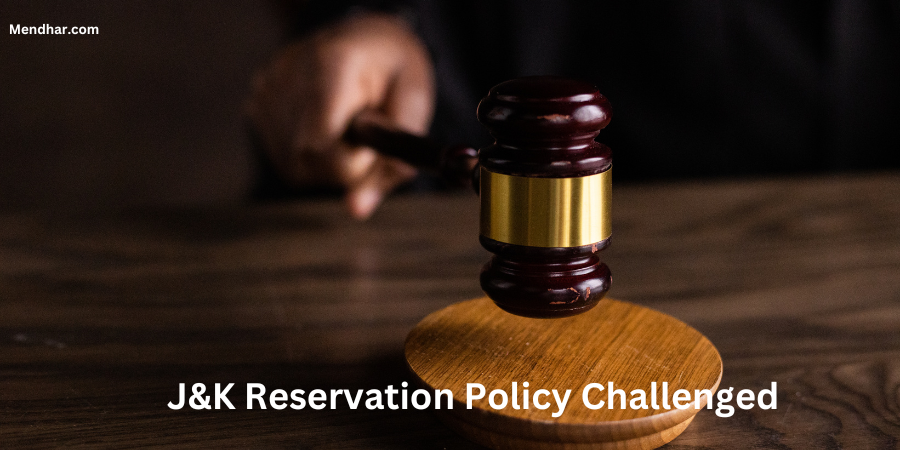Table of Contents
ToggleJ&K Reservation Policy Challenged: What It Means for the Future

The J&K reservation policy has sparked widespread debate, with recent amendments allocating over 60% of government jobs and educational quotas to reserved categories. Critics argue that this shift undermines meritocracy and fairness, while supporters see it as a long-overdue measure to uplift marginalized groups. The policy is now under judicial review, with a significant hearing scheduled in the Jammu and Kashmir and Ladakh High Court. The case has garnered national attention, as its outcome could reshape not only the reservation framework in the Union Territory (UT) but also set a precedent for similar policies across India.
The policy, dubbed the J&K reservation policy, has been challenged by petitioners advocating for a more equitable distribution of quotas. They argue that a policy skewed so heavily towards reserved categories disadvantages the general population, which constitutes a significant majority. As the legal battle unfolds, it raises important questions about balancing social justice with meritocracy. Understanding the implications of this policy and the potential changes it may undergo is crucial for stakeholders across the region. This article delves into the key aspects of the ongoing debate and explores what lies ahead for the future of reservations in Jammu and Kashmir.
What Changed in the J&K Reservation Policy?
The amendments to the J&K reservation policy introduced a 10% quota for the Pahari community, pushing the total reserved seats to over 60%. This leaves only 40% for the general category, despite the general population accounting for approximately 69% of the UT, as per the 2011 Census. Critics of the policy argue that such a disproportionate allocation undermines the principles of fairness and merit. Proponents, however, believe that these measures are essential to address the socio-economic disparities faced by historically marginalized groups.
The J&K reservation policy has thus become a focal point of debate, with questions about its fairness and constitutionality at the center. The High Court’s upcoming verdict could redefine the policy’s framework, potentially introducing a more balanced approach that considers both merit and social justice. The challenge is to strike a balance that uplifts disadvantaged communities without alienating the majority population or compromising meritocracy.
Petitioners' Argument for Reforming the J&K Reservation Policy
The petitioners challenging the J&K reservation policy in the High Court have outlined three major concerns. First, they propose the formation of a reservation commission led by a retired High Court judge. This commission would include representatives from all communities and base its recommendations on population data, ensuring that the policy reflects demographic realities. This approach aims to introduce a more scientific and inclusive method of determining quotas.
Second, they emphasize the need to adhere to the Supreme Court’s 50% ceiling rule on reservations. The current policy, exceeding this threshold, is seen as a threat to the open merit system. Petitioners argue that capping reservations at 50% would preserve meritocracy while still supporting affirmative action. Lastly, they call for equitable representation, suggesting that aligning quotas with population percentages could foster social harmony and inclusivity. If accepted, these proposals could significantly reshape the J&K reservation policy and influence broader national policies on reservations.
Social Implications of the J&K Reservation Policy
The controversy surrounding the J&K reservation policy extends beyond legal debates. It touches on fundamental issues of social justice, equity, and community relations. While reservations are a tool for correcting historical injustices, critics warn that excessive quotas risk creating divisions among communities. If the general category, which forms the majority, feels sidelined, it could lead to social unrest and a breakdown in trust.
Affirmative action must be balanced with meritocracy to ensure sustainable progress. The J&K reservation policy exemplifies the challenges of designing policies that promote inclusivity without undermining fairness. Policymakers must carefully consider the long-term social and economic impacts of such measures. A well-balanced policy could serve as a model for other regions grappling with similar issues, highlighting the importance of thoughtful, data-driven decision-making.
Government’s Defense of the J&K Reservation Policy
The administration, led by Lieutenant Governor Manoj Sinha, has defended the J&K reservation policy as a step towards greater inclusivity and social equity. Officials argue that the amendments address long-standing disparities and bring previously marginalized communities into the mainstream. However, critics contend that the policy lacks a solid empirical basis and disproportionately favors certain groups at the expense of the general population.
Transparency and stakeholder consultation are key to crafting policies that gain public trust. The administration’s defense underscores the importance of balancing different interests and ensuring that no group feels excluded. Moving forward, the call for a reservation commission reflects a broader demand for a more transparent, data-driven approach to policymaking. This could help address concerns about fairness and foster a sense of collective ownership over the policy.
Conclusion:-
The challenge to the J&K reservation policy highlights critical issues of fairness, representation, and social justice. As the High Court deliberates, Jammu and Kashmir stand at a pivotal moment. The decisions made in the coming months could shape the future of reservations in the UT and beyond. Policymakers must ensure that the policy reflects demographic realities while maintaining a commitment to meritocracy and social equity.
Reassessing the J&K reservation policy through a rational, inclusive approach is not only a legal necessity but also a social imperative. By addressing the concerns of all communities and adhering to constitutional principles, the administration can craft a policy that truly promotes progress, harmony, and trust.


